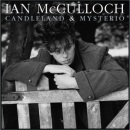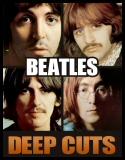Music Home / Entertainment Channel / Bullz-Eye Home
 Buy your copy from Amazon.com
Buy your copy from Amazon.com
| Ian McCulloch: Candleland & Mysterio Released: 2007 |
If we’re to speak of the solo career of Echo and the Bunnymen’s lead singer, Ian McCulloch, let us begin with this sad admission: if the man’s three albums were placed on a flow chart to show their commercial success, it would create a downward slope that’d send any skiing aficionado’s mouth into drool mode.
It’s a shame, really. And it all started so promisingly, too. Countless “Mac’s Back!” headlines resulted in 1989’s Candleland actually finding its way into the lower reaches of Billboard Top 200 Albums, which, you’ll agree, is a pretty decent accomplishment for a guy who’s not exactly a household name in the States. Unfortunately, the best that the 1992 follow-up, Mysterio, could manage was a Top 40 showing on the magazine’s Heatseekers chart, which resulted in the album making a quick trip to the cutout bins. We’d love to talk about how high the belated follow-up, 2003’s Sideling, charted, but it, uh, didn’t. (Ouch.)
But let us set aside Sideling for the purposes of this discussion -- well, except to say that, with a guest spot by Coldplay’s Chris Martin and production, mixing, and engineering by Cenzo Townshend, it’s a damned sight better than its sales figures would have you believe -- and focus on those first two McCulloch albums. The collaborative forces of Korova and Rhino Records have placed both Candleland and Mysterio into one set – each album gets its own disc – and expands them to include the B-sides from their respective singles.
From Candleland’s very first song, “The Flickering Wall,” it’s apparent that, from a musical standpoint, the most sorely missed member of the Bunnymen is not guitarist Will Sergeant but, rather, the band’s then-recently-deceased drummer, Pete DeFrietas. In fact, if we can trust the album’s credits, only two tracks on the record – “The White Hotel” and first single “Proud to Fall” – feature an actual human being on the skins. (If you’re wondering, that lucky individual was Boris Williams, late of the Cure.) Songs like “The Cape” and “Faith and Healing” end up cursed with a dated synth sound that, despite McCulloch’s ever-solid delivery, leave them stranded as artifacts of the late ‘80s rather than standing tall as legitimate classics. The title track, however, escapes unscathed, thanks in no small part to the lovely backing vocals of the Cocteau Twins’ Elizabeth Frazer; the ballad “Start Again” features very nice guitar work; and when listening back at the aforementioned “Proud to Fall,” you can still remember how hopes were so high for this album. It’s not that it’s bad; it’s just that McCulloch hadn’t entirely succeeded in finding the right music to accompany that memorable voice of his.
Mysterio was rather maligned upon its initial release, but looking back with fifteen years of hindsight, one thing’s for sure: it’s aged considerably better than Candleland. Part of it owes to the fact that McCulloch picked up a proper band to accompany him this time around, but, additionally, he just sounds more at ease with his surroundings…which is a bit ironic, given that he’s since admitted that, at the time, he was growing generally disinterested with his solo career. You can’t tell it from the material, however; “Close Your Eyes” is a particular highlight, thanks to the trumpet work by Joe Gibb, as is the album’s initial single, “Honeydrip,” which could pass for a Will Sergeant co-write track with very little effort. (So could closer “In My Head,” for that matter.) “Damnation” is a bit of a rocker, “Heaven’s Gate” chugs along with a guitar figure provided by none other than Aztec Camera’s Roddy Frame, and while it still seems odd that McCulloch ended up having a Leonard Cohen cover released as a single, “Lover Lover Lover” remains a nice, radio-friendly bit of alt-pop. There’s still the occasional re-visitation of that programmed feel, particularly on “Dug for Love,” but, all told, it’s surprising to find that Mysterio holds up to be the better of these two albums.
Normally, the bonus tracks on a reissue such as this would be considered for completists only, but not so here. There are seven additional songs from the Candleland era, and every one of them possesses a feel that’s fresher than the majority of the album proper; among the highlights are the bass-heavy “Toad” and the keyboard work on “The Dead End,” but the blend of guitar and strings on “Pots of Gold” makes for a particularly nice stylistic diversion. Unfortunately, Mysterio offers only one truly new track (the rest are simply acoustic, live, and remixed versions of existing songs), but that track, “The Ground Below,” at least provides two minutes and forty-five seconds of pleasantly jangly pop.
In the grand scheme of musical history, Ian McCulloch’s solo albums are never going to be outshined by the work he’s done with Echo & The Bunnymen, but they still remain worthy of a Bunnymen fan’s time, particularly with these new bonuses added to the mix.
wharris@bullz-eye.com






